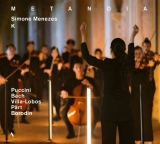Die brasilianische Dirigentin Simone Menezes hat diese CD unter den Titel Metanoia gestellt, die griechische Bezeichnung für den religiösen Begriff der Buße. Das Programm beginnt mit Puccini, der seiner einzigen Messkomposition ursprünglich den Titel Messa a 4 voci con orchestra gegeben hatte. Als er sie veröffentlichen ließ, wählte er jedoch den nicht ganz zutreffenden Titel Messa di Gloria, eine Gattung, die normalerweise kein Credo, kein Sanctus und kein Agnus Dei enthält. Das verleitet Menezes dazu, davon nur Kyrie und Gloria aufzuführen. Schade, denn bei der orchestral wie vokal fein vorbereiteten und sehr lebendigen Interpretation hätte ich mir gerne die ganze Messe angehört, nicht zuletzt wegen der hervorragenden Leistung des Vokalensembles Sequenza 9.3, das unverständlicherweise weder auf dem Cover noch auf dem Backcover erwähnt wird und auch im Booklet nur beim aufgeführten Werk steht und sonst keinerlei weitere Information wert ist.
Bachs Sarabande aus der Partita Nr. 1 mit Manon Galy, tief empfunden gespielt, führt zu einer emphatischen Interpretation der vierten Episode aus den Bachianas Brasileiras von Heitor Villa-Lobos. Es folgt das liebliche In spe, ein Werk für Bläserquintett und Streichorchester von Arvo Pärt, ehe dann die CD etwas überraschend mit Borodins Polowetzer Tänzen zu Ende geht, in denen die Dirigentin, wie sie im Booklet schreibt, die italienischen Farben betonen will, was ihr auch gut gelingt. Die teils sehr lyrische, teils schwungvoll tänzerische, insgesamt eher ungewöhnliche Aufführung, in der die Streicher gegenüber den Blasinstrumenten in den Hintergrund gedrängt werden, schafft so einen Bogen zu Puccinis Messe.
Brazilian conductor Simone Menezes has placed this CD under the title Metanoia, the Greek term for the religious concept of penance. The program begins with Puccini, who originally gave his only Mass composition the title Messa a 4 voci con orchestra. When he had it published, he chose the not entirely accurate title Messa di Gloria, a genre that normally does not include a Credo, Sanctus or Agnus Dei. Therefore Menezes chose to perform only Kyrie and Gloria from it. This is a pity, because with the orchestrally as well as vocally finely prepared and very lively interpretation I would have liked to listen to the whole Mass, not least because of the excellent performance of the vocal ensemble Sequenza 9.3, which incomprehensibly is mentioned neither on the cover nor on the back cover, and also in the booklet it is mentioned only at the listed work and is otherwise not worth any further information.
Bach’s Sarabande from Partita No. 1 with Manon Galy, played with deep feeling, leads to an emphatic interpretation of the fourth episode from Heitor Villa-Lobos’ Bachianas Brasileiras. The lovely In spe, a work for wind quintet and string orchestra by Arvo Pärt, follows before the CD ends somewhat surprisingly with Borodin’s Polovtsian Dances, in which the conductor, as she writes in the booklet, wants to emphasize Italian colors, and she succeeds well. The partly very lyrical, partly dance-like, altogether rather unusual performance, in which the strings are pushed into the background compared to the wind instruments, thus creates a link to Puccini’s Mass.






















